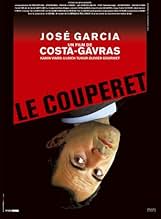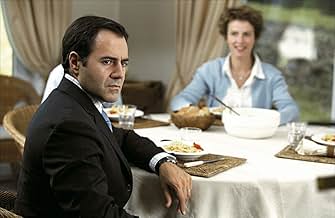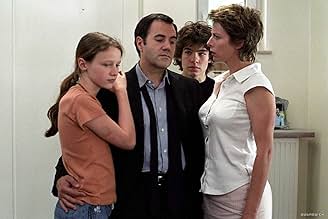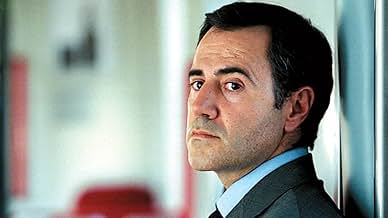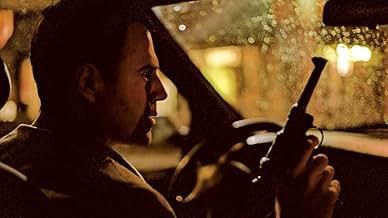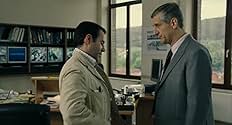IMDb-BEWERTUNG
7,3/10
8731
IHRE BEWERTUNG
Ein Chemiker (Garcia) verliert seinen Job durch Outsourcing. Zwei Jahre später und immer noch arbeitslos, findet er eine Lösung: Er will seine Konkurrenz wirklich ausschalten.Ein Chemiker (Garcia) verliert seinen Job durch Outsourcing. Zwei Jahre später und immer noch arbeitslos, findet er eine Lösung: Er will seine Konkurrenz wirklich ausschalten.Ein Chemiker (Garcia) verliert seinen Job durch Outsourcing. Zwei Jahre später und immer noch arbeitslos, findet er eine Lösung: Er will seine Konkurrenz wirklich ausschalten.
- Regie
- Drehbuch
- Hauptbesetzung
- Auszeichnungen
- 1 Gewinn & 5 Nominierungen insgesamt
Geordy Couturiau
- Maxime Davert
- (as Geordy Monfils)
Dieudonné Kabongo
- Quinlan Longus
- (as Dieudonné Kabongo Bashila)
Empfohlene Bewertungen
Costa -Gavras 's body of work does not lack in unity.
Except for his two fist movies,which were thrillers , a romantic tale ("Clair de Femme" ) and a comedy that does not count ("Conseil de Famille' ) all that he has made display social and political concerns.
From his early French classics ("Z "(He is alive) "L'Aveu" ,"Etat de Siège") to his American period ("Missing" "Betrayed" "Music Box" ) to his French comeback ("Amen" ) there is a cohesion which even André Cayatte ,his closest contender in the field,did not reach.
And then "Le Couperet" .Don't be mistaken.It's not that much different from CG's previous efforts.Based on a Donald Westlake novel-a writer whose black humour was fierce- ,it contains lines Henri Jeanson or Michel Audiard would not have disowned.Comedy walks a fine line ,but it walks hand in hand with tragedy .You must watch it seriously to realize what heavy things CG is saying.While making his film verge on parody,he is also putting the French society in a less exalted light than we have been used to seeing it in.Suddenly our world seems frightening (the gas station man who hides a gun in his cash register,the icily impersonal female headhunter -I wish I had had my gun!-)It is really the society of the leave-you-behind and perhaps -I hope not - an omen of things to come in the future.I do not speak of the murders obviously.There are other ways of destroying a human being."When I saw them enter the restaurant ,the German ex-engineer says,I knew that I didn't stand the slightest chance ".
The last picture has (and will be) widely talked about.Actually it reminds me of the ending of Mankiewicz's "All about Eve " when Phoebe tries Eve's crown .When you get to the top,there is nowhere to go but down.
A film noir,a farce,a psychological drama ,a social satire and a movie where CG talks politics.One of his most accessible and one of his strongest works.At seventy plus,CG is as young as the reporter who bothered the fascists in "Z".He is abetted by Jose Garcia on top of his game.
Like this?Try these.....
"Extension du domaine de la lutte" Philippe Harel 1998
"L'adversaire" Nicole Garcia 2002
"Working girl" Mike Nichols 1988
Except for his two fist movies,which were thrillers , a romantic tale ("Clair de Femme" ) and a comedy that does not count ("Conseil de Famille' ) all that he has made display social and political concerns.
From his early French classics ("Z "(He is alive) "L'Aveu" ,"Etat de Siège") to his American period ("Missing" "Betrayed" "Music Box" ) to his French comeback ("Amen" ) there is a cohesion which even André Cayatte ,his closest contender in the field,did not reach.
And then "Le Couperet" .Don't be mistaken.It's not that much different from CG's previous efforts.Based on a Donald Westlake novel-a writer whose black humour was fierce- ,it contains lines Henri Jeanson or Michel Audiard would not have disowned.Comedy walks a fine line ,but it walks hand in hand with tragedy .You must watch it seriously to realize what heavy things CG is saying.While making his film verge on parody,he is also putting the French society in a less exalted light than we have been used to seeing it in.Suddenly our world seems frightening (the gas station man who hides a gun in his cash register,the icily impersonal female headhunter -I wish I had had my gun!-)It is really the society of the leave-you-behind and perhaps -I hope not - an omen of things to come in the future.I do not speak of the murders obviously.There are other ways of destroying a human being."When I saw them enter the restaurant ,the German ex-engineer says,I knew that I didn't stand the slightest chance ".
The last picture has (and will be) widely talked about.Actually it reminds me of the ending of Mankiewicz's "All about Eve " when Phoebe tries Eve's crown .When you get to the top,there is nowhere to go but down.
A film noir,a farce,a psychological drama ,a social satire and a movie where CG talks politics.One of his most accessible and one of his strongest works.At seventy plus,CG is as young as the reporter who bothered the fascists in "Z".He is abetted by Jose Garcia on top of his game.
Like this?Try these.....
"Extension du domaine de la lutte" Philippe Harel 1998
"L'adversaire" Nicole Garcia 2002
"Working girl" Mike Nichols 1988
People who characterize this film as a comedy obviously haven't got it. The comic element is just a thin surface. This is a tragic story and a very strong political statement. Obviously Bruno's decisions and actions are absurd, but his circumstances are not. The movie offers an incisive look at the dark reality of chronic unemployment. Corporate greed leads to story after story after story of desperation. Westlake and Gavras know that in order to pass the message you have to lighten up the atmosphere (a la Truman Show), or else the viewer won't sit the whole movie. In order to appreciate the film you have to marginalize the main plot element (the murder story) and concentrate on all the subplots.
Maybe the best 'noir' movie I've seen in the last years, and definitively the best Donald Westlake adaptation so far, "Arcadia" is the story of a man obsessed with a job, who thinks that the only way to get it is killing every candidate who can be better than him, and must cope with his many mistakes and family problems. It sounds like a tragedy, or a drama, but it is the best piece of black (or not so black) humor combined with noir I remember, which is surprising: I didn't know that Costa-Gavras had so much sense of humor. There are many symbols, allegories, but above it all, it mentions every controversial and denounce topic in existence for just one, two or three minutes, just to mention it. The result is, incredibly and amazingly, funny, intellectually engaging, extremely suspenseful (the results of every situation and, at last, the end of the movie are unpredictable) and a master class of narrative progression, at least until the last 20 minutes, where the movie drags. But until then it is a flawless masterpiece, and it deserves to be watched over and over again. José García is another surprise, a very good comedian.
Costa Gavras is a master of the political film. Political films in general are not my cup of tea. They try to convey some kind of message to the public, and they do it by portraying the persons in a stylized way, losing in depth in the process. People are portrayed realistically but their conflicts are simplified because the political film intends to portray society and its problems - unemployment, hunger, class exploitation and so on - in other words, they talk about the big (lack of bread, for instance) and forget the small (emotions like loneliness and sadness, for instance).
Many political films concerned about their objectivity are quite emotionless, or else their emotions are one-sided - bad and ugly live here, beauty and love live there, or the other way around.
FEW POLITICAL FILMS are able to bridge this gap: to talk about society and at the same time not forget the individual man and his/her very complex universe and contradictions. SOME OF THESE FILMS ARE the masterpieces of neorealism: "Ladri di Bicicletta" and "Umberto D" by Vittorio de Sica, "Los Olvidados" by Buñuel and many others.
Costa Gavras doesn't reach this goal. His films are efficient and convey their message to the public, but they lack warmth.
"Le Couperet" is nonetheless an interesting film - a man that works as a chemist loses his job and after 2 years of unemployment decides to kill whoever stands in his way to get another job - so he places an ad of an imaginary enterprise in the newspaper offering a chemist job (his professional area) and rents a post box to read the answers he gets. He reads all the résumés and proceeds to kill all the people that are equal or more qualified than him - so that in the end he'll get the job because he will be the only remaining choice. All the while he will go on living normally with his family. He will suffer emotional crises, his marriage will become strained but no one will suspect anything at all of his alternative activities.
The film, after all, is very entertaining and gives a sad picture of France (and Western Europe I would say), suffering economic crisis and rising doubts. Is it possible with the globalization to maintain a very expensive Social Welfare and have to face a growing economic erosion? In USA (as far as I know), for instance, some unemployed people live on the streets or under the bridges. In France and Western Europe, unemployed people are still taken care of. Till when? Many enterprises are closing or cutting expenses (that means firing people).
Costas Gavras films are good because they make questions about the world in which we live, they make us think, but his films don't really touch me - I would say they provide food for thought but not food for the heart.
Many political films concerned about their objectivity are quite emotionless, or else their emotions are one-sided - bad and ugly live here, beauty and love live there, or the other way around.
FEW POLITICAL FILMS are able to bridge this gap: to talk about society and at the same time not forget the individual man and his/her very complex universe and contradictions. SOME OF THESE FILMS ARE the masterpieces of neorealism: "Ladri di Bicicletta" and "Umberto D" by Vittorio de Sica, "Los Olvidados" by Buñuel and many others.
Costa Gavras doesn't reach this goal. His films are efficient and convey their message to the public, but they lack warmth.
"Le Couperet" is nonetheless an interesting film - a man that works as a chemist loses his job and after 2 years of unemployment decides to kill whoever stands in his way to get another job - so he places an ad of an imaginary enterprise in the newspaper offering a chemist job (his professional area) and rents a post box to read the answers he gets. He reads all the résumés and proceeds to kill all the people that are equal or more qualified than him - so that in the end he'll get the job because he will be the only remaining choice. All the while he will go on living normally with his family. He will suffer emotional crises, his marriage will become strained but no one will suspect anything at all of his alternative activities.
The film, after all, is very entertaining and gives a sad picture of France (and Western Europe I would say), suffering economic crisis and rising doubts. Is it possible with the globalization to maintain a very expensive Social Welfare and have to face a growing economic erosion? In USA (as far as I know), for instance, some unemployed people live on the streets or under the bridges. In France and Western Europe, unemployed people are still taken care of. Till when? Many enterprises are closing or cutting expenses (that means firing people).
Costas Gavras films are good because they make questions about the world in which we live, they make us think, but his films don't really touch me - I would say they provide food for thought but not food for the heart.
I completely disagree with the reviewer who called this a'TV movie'. it's anything but... (did he see it on a TV screen?). It's a thriller that actually deserves to be called by that over-used adjective 'Hitchcockian' as we gradually identify more and more what the lead character who starts off as what, a hit-man, a serial-killer? As we get into his motives and hit and miss way of carrying them out together with unrelated encounters with the cops we are willing, despite ourselves, that he will succeed. Why does this not have a US distributor yet? I saw it with an appreciative crowd in Paris earlier this year. Jose Garcia who I last saw overdoing it in a so-so comedy called APRES VOUS is very good as the ordinary guy pushed to the limit and Karen Viard also always watchable as his blandly oblivious wife, who also becomes involved via a different set of crimes involving their family.
Wusstest du schon
- WissenswertesAds on billboards in the background were created by famous Italian photographer Oliviero Toscani, a friend of the director.
- PatzerAt the beginning, when Davert (Garcia) gets out of the shower and then immediately returns to the bathroom to vomit, you can see in the mirror that he is wearing an underwear.
- Zitate
Gérard Hutchinson: [When the interviewer abruptly ends the interview] I said to myself, lucky I didn't have the gun on me.
- VerbindungenReferenced in Elite Squad: Im Sumpf der Korruption (2010)
Top-Auswahl
Melde dich zum Bewerten an und greife auf die Watchlist für personalisierte Empfehlungen zu.
- How long is The Ax?Powered by Alexa
Details
- Erscheinungsdatum
- Herkunftsländer
- Sprachen
- Auch bekannt als
- Jobkiller - Eine mörderische Karriere
- Drehorte
- Produktionsfirmen
- Weitere beteiligte Unternehmen bei IMDbPro anzeigen
Box Office
- Weltweiter Bruttoertrag
- 4.885.946 $
- Laufzeit
- 1 Std. 57 Min.(117 min)
- Farbe
- Sound-Mix
- Seitenverhältnis
- 1.85 : 1
Zu dieser Seite beitragen
Bearbeitung vorschlagen oder fehlenden Inhalt hinzufügen

![Bande-annonce [OV] ansehen](https://m.media-amazon.com/images/M/MV5BMWNjMWQ4ZmItOTVjMi00YzkxLWIzYmYtOWVjNTg3MDRkMzIwXkEyXkFqcGdeQXRyYW5zY29kZS13b3JrZmxvdw@@._V1_QL75_UX500_CR0)
